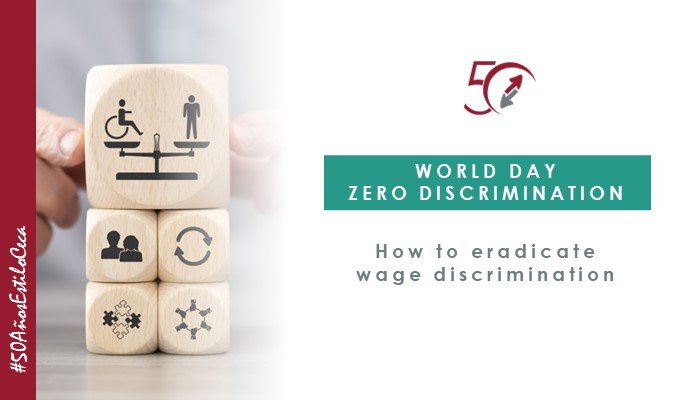
Table of contents
On March 1 we celebrate World Zero Discrimination Day, and for this article we will focus on wage discrimination in the field of labor relations.
As a starting point, we must remember that since 2019 there has been an obligation for all companies, regardless of their size, to keep a record of salaries segregated by sex and professional categories. This obligation was reflected in a new wording of article 28 of the Workers' Statute. It is called and commonly known as “salary record”.
Subsequently, as a consequence of the publication and entry into force of RD 902/2020 of October 13, in force since April 13, 2021, this obligation was expanded to include the obligation to carry out a remuneration audit for equivalent or equal value positions. for all companies that are required to have an equality plan, that is, companies with more than 50 workers.
These obligations are created with the purpose of ensuring that companies are transparent in their remuneration, because only through remuneration transparency will wage discrimination in companies be eliminated.
How do I know that there is no salary discrimination in my company?
When our clients address compliance with the aforementioned obligations, in the context of the preparation and negotiation of equality plans, the first thing they tell us is “no, in my company there is no discrimination in salary matters.” And it is usually true, although, on the rare occasions in which we find unadjusted salary gaps, it is usually something unknown by companies and is usually explained in archaic models that have been inherited from people management systems that have not been modernized or updated. .
In our experience, companies do not pay women and men differently due to this circumstance, but it may happen that remuneration policies are outdated and reward circumstances or parameters that are obsolete and that implicitly and unconsciously for employers may have a bias due to sex reason.
Therefore, when we are commissioned with these projects, the first thing we recommend is to examine their remuneration policy. There is no discrimination if the company pays according to what is stated in the fixed salary tables published in the collective agreements. Discrimination usually appears in concepts linked to availability, productivity or presence required in the workplace.
The second thing that we usually recommend is to make a correct assessment of the jobs, drawing the map of the organization's positions and providing them with effective and objective content, through the job descriptions. Only through a correct assessment of jobs carried out through objective parameters can we have a map of our company's talent.
As a next step, we ask our clients to analyze and assess how workers are compensated in the sector where their activity is carried out, given that it is highly relevant to know which are the key positions that the market is demanding the most in order to justify that their remunerations are higher.
Once all the previous steps have been carried out, we will be able to have information about whether there is a salary gap in the organization or not, understood as the difference in salaries received between women and men.
Having said the above, we must remember that the wage gap is not always discriminatory; there may be a difference in wages that is “adjusted” and that can be explained or justified on objective reasons such as the job position, the sector or the type of activity carried out. develop, but it is especially relevant that this difference can be justified to avoid it being considered discriminatory. Therefore, it is essential to have made a correct assessment of the positions and a detailed study of the remuneration system.
In conclusion, from the humble point of view of the person who writes these lines, we can affirm, after having participated in many equality and pay transparency projects, that, as a general rule, our companies do not establish salary criteria based on the sex of the employee. working person, but we also recognize that on many occasions they are being compensated for circumstances that may imply bias or discrimination. Therefore, we recommend carrying out an exercise in honesty and transparency in organizations, as this will be the only way to eradicate salary discrimination in companies.
Our team of lawyers who are experts in diversity, inclusion and equality can help you resolve any issue to address possible discriminatory causes in your company. Contact with us.
Director in the labor area
Add new comment